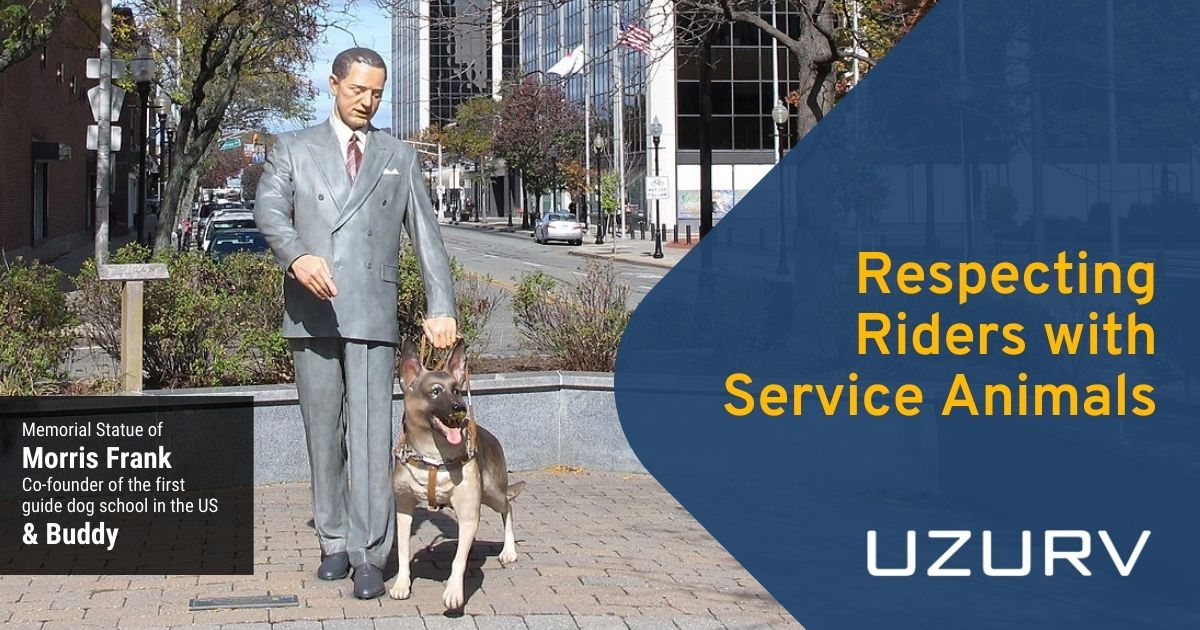
Put simply, these “person-service animal” partnerships are life-changing and powerful.
In one form or another, service animals ![]() have been in existence in America since at least 1929. When Morris Frank
have been in existence in America since at least 1929. When Morris Frank ![]() , one of the founders of The Seeing Eye
, one of the founders of The Seeing Eye ![]() , received his first guide dog, a female German Shepherd he named Buddy. At that time, there were no laws guaranteeing Frank’s right to travel with Buddy. But throughout the intervening decades, all fifty US states enacted laws that defined and protected the rights of first blind and then other people with disabilities to possess and travel with service animals. In 1990, the Americans with Disabilities Act
, received his first guide dog, a female German Shepherd he named Buddy. At that time, there were no laws guaranteeing Frank’s right to travel with Buddy. But throughout the intervening decades, all fifty US states enacted laws that defined and protected the rights of first blind and then other people with disabilities to possess and travel with service animals. In 1990, the Americans with Disabilities Act ![]() established national requirements for how the term “service animal” is defined, the rights that people with disabilities possess for having and traveling with service animals, and the responsibilities that accompany these rights.
established national requirements for how the term “service animal” is defined, the rights that people with disabilities possess for having and traveling with service animals, and the responsibilities that accompany these rights.
According to a recent study by the Pew Research Center ![]() , about 500,000 Americans with disabilities currently use service animals to live with a greater degree of autonomy, dignity, and grace. These amazing animals help their owners to complete daily tasks that might otherwise be impossible—everything from maintaining balance and retrieving dropped articles to opening doors, hearing doorbells, detecting seizures before they happen, and navigating just about any environment—from a quiet country lane to a busy city street or a crowded train station or airport. In return, service animals receive the love and care of their owners. Put simply, these “person-service animal” partnerships are life-changing and powerful.
, about 500,000 Americans with disabilities currently use service animals to live with a greater degree of autonomy, dignity, and grace. These amazing animals help their owners to complete daily tasks that might otherwise be impossible—everything from maintaining balance and retrieving dropped articles to opening doors, hearing doorbells, detecting seizures before they happen, and navigating just about any environment—from a quiet country lane to a busy city street or a crowded train station or airport. In return, service animals receive the love and care of their owners. Put simply, these “person-service animal” partnerships are life-changing and powerful.
Nevertheless, people with disabilities are continuing to report discrimination and denials of service when traveling with their service animals. They speak of business owners, transportation providers, and others who do not understand the requirements of the ADA and the other service animal access laws that are still on the books in all fifty states. They experience fear and rejection from people who believe their animals may be unhealthy, unclean, unsafe, or fraudulent. They are peppered with questions about their disabilities and demands for documentation proving that their animals are legitimate (illegal under the ADA). Worst of all, they share that these denials of access, whether at a store, in a restaurant, or on a vehicle, create a chilling impact on the quality of their lives, on their independence, and on their safety. Some people with disabilities are staying home, simply because they are tired of having their access denied.
At UZURV, we are committed to safe and welcoming transportation for people with disabilities who travel with service animals. We understand and embrace our legal and ethical responsibilities. Driver onboarding at UZURV includes our requirement for service animal access and their understanding of the only two questions drivers can ask when unsure about whether or not an animal is a service animal. Our clear policies and the dedication of our drivers mean that denial of service is practically non-existent with UZURV rides. Any difficulty a rider has starting a trip is often dealt with in real-time and a UZURV driver denying a ride because of a service animal means the immediate and permanent removal from the UZURV platform.
Additionally, we consider it our duty to ensure that every UZURV driver on our platform honors our corporate-level commitment to welcome every rider and every service animal – every time. We invite any rider who has experienced anything less than our best to reach out through our Customer Service Center. Or by sending an email to ridersupport@uzurv.com so that we can address this issue, each and every time it comes up.
